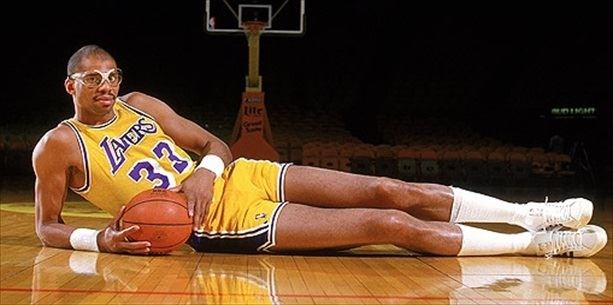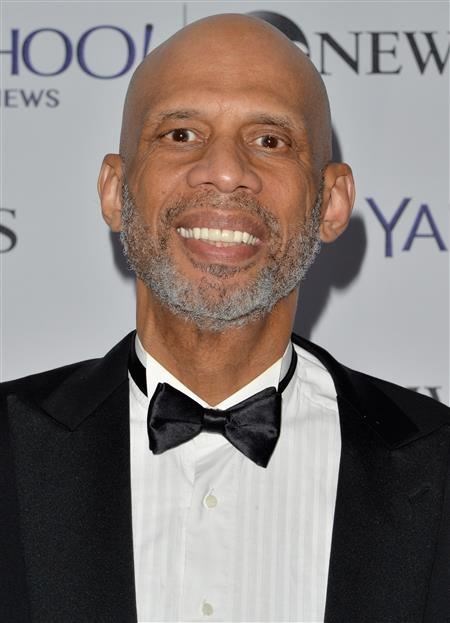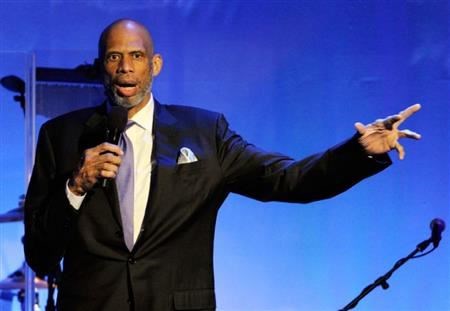 |
| exnba.com |
"One man can be a crucial ingredient on a team, but one man cannot make a team."(Abdul-jabbar)This quote shows the devotion and integrity that Kareem Abdul-Jabbar brought to the world.With an intensity that disguised his shyness and a dancing jump shot nicknamed the "sky hook," Kareem Abdul-Jabbar dominated the National Basketball Association Ferdinand Lewis Alcindor Jr. was born in Harlem, New York, on April 16, 1947. Alcindor accepted a scholarship from UCLA in 1965 and began studying in the newly emerging field of black literature. As a freshman, he worked on his basketball skills to overcome his awkwardness. He led the freshman squad to an undefeated season as well as a 75-60 victory over the varsity team, which had won the National Collegiate Athletic Association championship in two of the previous three years. In his second year, 1967, Alcindor worked with coaching legend John Wooden.six professional championships with the Milwaukee Bucks and Los Angeles Lakers.A hero must possess social power and activism supporting something they truly believe in. Kareem Abdul-Jabbar is a hero and the greatest center in basketball. He is not only known for what he did on the court but for his powerful activism, putting his life to the side for others,and was a voice for African Americans.
 |
| en.wikipedia.org |
Kareem Abdul-Jabbar's powerful activism showed when he was in college and a terrible tragedy occurred: "When Dr. King was assassinated, within a couple of days I was involved at UCLA. We had a demonstration. ... People were telling me, 'Hey, you're going to get a chance to play in the NBA and make a lot of money, you shouldn't be out here protesting like this.'To me there was no correlation. Somebody needed to speak out about what had happened("Kareem Abdul-Jabbar: 'If It's Time To Speak Up, You Have To Speak Up'"NPR. NPR, n.d. Web. 04 Feb. 2016.)."when Kareem was in college that was around the time MLK was assassinated and even though Kareem had a future in B-ball he went and protested knowing he could get hurt. Even when Kareem was recovering from surgery he still made time for the public, "Despite having had quadruple-bypass surgery just a few months earlier, Abdul-Jabbar didn't look all that different than he did during his last days on the Los Angeles Lakers in the late 1980s("The New York Times." What the World Got Wrong About Kareem Abdul-Jabbar. N.p., n.d.)." This shows that Kareem even though he had many surgeries he went out in public to keep his social representation as it should be. This proves how Kareem's powerful activism classifies him as a hero.
Kareem's personality of putting his life to the sides for others proves he is a hero. when Kareem was sick he had to still help his people which, "In 2009, Abdul-Jabbar announced that he was suffering from a rare form of leukemia called chronic myeloid leukemia..." "...revealing his deep devotion to the Hanafi Muslims. He believes the Islamic religion (which differs from the nationalistic Black Muslims) and determined personal effort have much to offer for a great life. Abdul-Jabbar also is greatly influenced by the life and struggles of late civil rights activist Malcolm X. The book was well-received by critics.Sports Illustrated writer Bruce Newman called the book ""an intelligent, thoughtful autobiography"("Kareem Abdul-Jabbar." UXL Biographies. Detroit: UXL, 2011. Student Resources in Context. Web. 3 Feb. 2016)."Kareem was diagnosed with a type of leukemia in 2009, but he could of had it anytime earlier just didn't recognize the symptoms. He stood for his people even when he was sick and knew he need help but instead he helped others. When the family of the leader, Hamaas, was murdered in cold blood Kareem couldn't take it and so he had to do something, "Abdul-Jabbar bought a home in Washington, D.C., that became the Hanafi headquarters. Then, in 1973, tragedy struck."Some members of the Black Muslims had seen Hamaas as a threat to their organization and eight or nine men had been sent to kill him," Abdul-Jabbar wrote in his 1983 autobiography, Giant Steps. "The gang had stormed the house that afternoon, but when they found that Hamaas, his wife, and one of his daughters had gone out shopping, they had tied everybody up and waited for him.""When Hamaas hadn't returned they'd grown impatient. They'd ransacked the rooms and then, one by one, attacked everybody there. They killed Hamaas' three sons: Daud, who was my age, Abdullah, and Rahman Uddein, his 10-year-old. They put bullets in the head of his daughter Amina and his second wife Bibi. They drowned three infants in the bathtub and the sink.""The fact that I converted to Islam scared some in the press because they didn't understand why I would do it nor what the religion was about," Abdul-Jabbar told me via email. "To them it seemed like a rejection of America rather than an expression of my own beliefs(Silverman, Robert. "Kareem Abdul-Jabbar Finds His Voice: The NBA Legend On White Privilege, Politics, And Islam." The Daily Beast. Newsweek/Daily Beast, n.d. Web. 21 Feb. 2016.)." Kareem heard about what happened and he still converted knowing that their is a possibility that he could be in trouble. Kareem's personality of putting his life to the side for others proves he is a hero.
 |
| (www.sltrib.com) |
Kareem's Voice for people who do not have a voice in society truly shows that he is a hero. Kareem wrote a book about how life is to be a Hanafi Muslim,"He wrote his autobiography with Peter Krobler, Giant Steps: An Autobiography of Kareem Abdul-Jabbar, revealing his deep devotion to the Hanafi Muslims. He believes the Islamic religion (which differs from the nationalistic Black Muslims) and determined personal effort have much to offer for a great life ("Kareem Abdul-Jabbar." UXL Biographies. Detroit: UXL, 2011. Student Resources in Context. Web. 3 Feb. 2016)."Kareem wrote a book to enlighten people of Hanafi Muslims showing how their life and struggles are. Kareem's voice for people that wouldn't be heard in society shows his role as a hero.
Through powerful activism, the personality of putting his life to the side for others, and being a voice for the people that have no voice in society proves Kareem Abdul-Jabbar is a hero. Kareem was one of the greatest basketball players of all-time and after his retirement he still stayed as a hero but to people of all religion and race. Because of Kareem he shows us that when something you believe in is being destroyed through physical or mental damage you should do what you can to protect it.
work cited
"Kareem Abdul-Jabbar." UXL Biographies. Detroit: UXL, 2011. Student Resources in Context. Web. 29 Jan. 2016.
"Kareem Abdul-Jabbar: 'If It's Time To Speak Up, You Have To Speak Up'"NPR. NPR, n.d. Web. 04 Feb. 2016.
Bio.com. A&E Networks Television, n.d. Web. 11 Feb. 2016.
"The New York Times." What the World Got Wrong About Kareem Abdul-Jabbar. N.p., n.d.
Silverman, Robert. "Kareem Abdul-Jabbar Finds His Voice: The NBA Legend On White Privilege, Politics, And Islam." The Daily Beast. Newsweek/Daily Beast, n.d. Web. 21 Feb. 2016.
Page created on 2/23/2016 12:00:00 AM
Last edited 2/23/2016 12:00:00 AM
